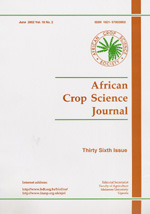
|
African Crop Science Journal
African Crop Science Society
ISSN: 1021-9730
EISSN: 1021-9730
Vol. 5, No. 2, 1997, pp. 107-117
|
 Bioline Code: cs97017
Bioline Code: cs97017
Full paper language: English
Document type: Research Article
Document available free of charge
|
|
|
African Crop Science Journal, Vol. 5, No. 2, 1997, pp. 107-117
| fr |
Ortiz, R. & Vuylsteke, D.
Résumé
L'hybridation et les manipulations ploodiques, c'est-a-dire les croisements
interploidiques, ont permis d'obtenir les hybrides polyploides des
plantains et des banaiers (Musa spp. L.). L'identification des hybrides
prometteurs susceptibles de donner lieu aux cultivars necessite un essai au
champ en vue d'evaluer leur performance agricole. Le potentiel de nouveaux
hybrides selectionnes a ete evalue en les comparant a leurs races
ancestrales triploides. Cette comparaison a ete effectuee dans deux essais
composes respectivement de 25 et 30 genotypes. 26 tetraploide primaires, 7
triploides secondaires, 3 tetraploides secondaires et l'hybride tetraploide
tertiaire ont ete evalues en meme temps que 7 races terrestres triploides
et 3 ancetres diploides de 1993 a 1996. A partir de ce vaste essai en
champ et de la liste des preferences des fruits, 7 hybrides prometteurs ont
ete selectionnes en fonction des criteres suivants: la resistance
souhaitee aux contraintes du milieu, les traits agronomiques acceptables et
la qualite adequate des fruits. Les hybrides selectionnes etaient les
tetraploides primaires noirs resistants au sigatoka et tolerants aux virus.
Il s'agit de tetraploides TMPx 7152-2 (plantain),TMPx 7356-1 (plantain),
TMBx 5295-1 (bananier feculent), et de triploides secondaires de Musa
(TM3x) 14604-35, 15108-1, 15108-2, et 15108-6. Ce germoplasme ameliore a
ete introduit au Nigeria pour des essais multilocalites et en Ouganda pour
des essais locaux. A pres l'evaluation de leur stabilite et de leur
adaptation au niveau local, on peut les promouvoir comme nouveaux cultivars
dans les agroecozones specifiques. L'impact final de ces hybrides de Musa
dans l'agriculture africaine sera mesure losque ce germoplasme deviendra
une composante integrale de l'agriculture locale et des systemes
alimentaires.
Mots Clés
Bananier, reproduction, heterosis, hybrides, plantain, polyploides
|
| |
| en |
Improved polyploid musa germplasm developed through ploidy manipulations
Ortiz, R. & Vuylsteke, D.
Abstract
Plantain and banana (Musa spp. L.) polyploid hybrids have been obtained
after interspecific hybridisation and ploidy manipulations (i.e.,
interploidy crosses). The identification of promising hybrids for cultivar
release requires their field testing to assess agronomic performance. The
potential of new polyploid hybrid selections was evaluated in comparison
with their triploid ancestral landraces in two trials consisting of 25 and
30 genotypes, respectively. Twenty-six primary tetraploids, seven secondary
triploids, three secondary tetraploids and one tertiary tetraploid hybrid
were evaluated along with seven triploid landraces and three diploid
ancestors from 1993 to 1996. Following this extensive on-station field
testing and fruit taste panels, seven promising hybrids were selected based
on their desirable attributes: desired resistance to biotic stresses,
acceptable agronomic traits and adequate fruit quality. The selected
hybrids were the black sigatoka-resistant and virus-tolerant primary
tetraploids TMPx 7152-2 (plantain), TMPx 7356-1 (plantain), TMBx 5295-1
(starchy banana), and the secondary Musa triploids (TM3x) 14604-35,
15108-1, 15108-2, and 15108-6. This improved germplasm has been advanced
for multilocational trials in Nigeria and for local testing in Uganda.
After assessing their stability and local adaptation, they may be released
as new cultivars in specific agroecozones. The final impact of these Musa
hybrids in African agriculture will be measured when this new germplasm
becomes an integral component of local farming and food systems.
Keywords
Banana, breeding, heterosis, hybrids, plantain, polyploidy
|
| |
© Copyright 1997 - African Crop Science Society
|
|
